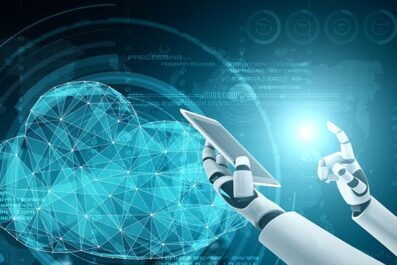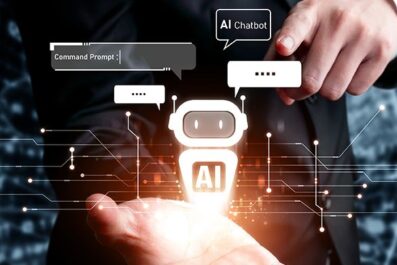How AI is Shaping the Future of Global IT Solutions
Artificial Intelligence (AI) is no longer just a buzzword; it has become a key force driving transformation across industries, particularly in the domain of Information Technology (IT).
 5 mins read
5 mins read 
From software development company to customer support, AI’s impact is profound and far-reaching, promising to revolutionize the global IT landscape.
This blog delves into how AI is reshaping the future of IT solutions, offering insights into its potential to foster innovation, enhance operational efficiency, and provide a competitive edge in the global market.
AI in Software Development: A New Era of Innovation

Software development has traditionally been labor-intensive, requiring significant time and resources. However, AI is rapidly changing the game by automating many aspects of development like custom software development and Python web development, making the process faster, more efficient, and less prone to human error.
- Automated Code Generation and Optimization
AI-powered tools like GitHub’s Copilot are revolutionizing how code is written. These tools can suggest code snippets, optimize existing code, and even generate entire functions based on the developer’s input. This not only speeds up the development process whether is mobile app development or website development but also reduces the likelihood of bugs and errors, resulting in more robust and reliable software.
- AI-Driven Testing and Quality Assurance
Testing is a critical phase in software development, ensuring that the final product meets all requirements and functions as expected. AI enhances this process by automating test case generation, execution, and analysis. Tools like Testim and Applitools use AI to simulate user interactions, identify potential issues, and ensure that the software performs optimally across different environments and scenarios.
- Continuous Integration and Deployment (CI/CD)
AI is streamlining CI/CD processes by predicting potential bottlenecks, optimizing resource allocation, and automating routine tasks. This allows development teams to deliver updates and new features faster, maintaining a competitive edge in a rapidly changing market.
- AI in IT Operations: Enhancing Efficiency and Reliability
In IT operations, AI is proving to be a game-changer, helping organizations manage complex infrastructures, optimize resource usage, and ensure the reliability of their systems.
- Predictive Maintenance and Monitoring
AI-driven predictive analytics tools can monitor system performance in real-time, identifying potential issues before they become critical. This proactive approach to maintenance reduces downtime, enhances system reliability, and minimizes the cost of repairs.
- Resource Optimization
AI algorithms can analyze usage patterns and predict future demand, allowing IT teams to optimize resource allocation. This ensures that systems are running efficiently, with the right amount of resources allocated to each task, reducing waste and lowering operational costs.
- Security and Threat Detection
Cybersecurity is a growing concern for IT organizations worldwide. AI is enhancing security measures by identifying potential threats and vulnerabilities faster than traditional methods. AI-driven security tools can analyze vast amounts of data, detect unusual patterns, and respond to threats in real time, providing an additional layer of protection for IT infrastructures.
AI in Customer Support: Revolutionizing User Experience

Customer support is another area where AI is making significant strides, transforming how businesses interact with their customers and providing a more personalized and efficient user experience
- AI-powered chatbots and Virtual Assistants
AI-driven chatbots and virtual assistants are becoming increasingly sophisticated, capable of handling a wide range of customer queries with minimal human intervention. These tools can provide instant responses, resolve common issues, and even guide users through complex processes, improving customer satisfaction and reducing the workload on support teams.
- Sentiment Analysis and Customer Insights
AI tools can analyze customer interactions to gauge sentiment and identify potential issues before they escalate. This allows businesses to address customer concerns proactively, enhancing the overall user experience and building stronger customer relationships.
- 24/7 Support Availability
AI-driven customer support solutions can operate around the clock, providing instant assistance to customers regardless of time zones. This is particularly beneficial for global businesses, ensuring that customers receive the support they need when they need it, without delays.
AI in Data Management: Unlocking the Power of Big Data

Data is the lifeblood of modern businesses, and AI is playing a crucial role in helping organizations manage, analyze, and derive insights from vast amounts of data.
- Data Analytics and Insights
AI-powered analytics tools can process and analyze large datasets at unprecedented speeds, uncovering patterns, trends, and correlations that would be impossible for humans to detect. This enables businesses to make data-driven decisions, optimize operations, and identify new growth opportunities.
- Data Governance and Compliance
As data privacy regulations become more stringent, AI is helping organizations ensure compliance by automating data governance processes. AI tools can monitor data usage, enforce policies, and flag potential compliance issues, reducing the risk of costly fines and reputational damage.
- AI-Driven Personalization
In the era of big data, personalization is key to delivering a superior customer experience. AI algorithms can analyze customer data to deliver personalized recommendations, offers, and content, increasing engagement and driving sales.
AI in Innovation and Competitive Advantage: The Global Perspective

In the global IT market, innovation is the key to staying ahead of the competition. AI is driving innovation across industries, enabling businesses to develop new products, services, and business models that were previously unimaginable.
- Accelerating Product Development
AI is shortening the product development cycle by automating research, design, and testing processes. This allows businesses to bring new products to market faster, responding to changing customer demands and staying ahead of competitors.
- Enhancing Decision-Making
AI-driven decision support systems provide executives with real-time insights and recommendations, enabling them to make more informed decisions. This is particularly valuable in fast-paced global markets, where the ability to quickly adapt to changing conditions is critical to success.
- Driving Digital Transformation
AI is at the heart of digital transformation, helping organizations adopt new technologies, optimize processes, and create more agile and resilient business models. Companies that embrace AI are better positioned to thrive in the digital economy, gaining a competitive edge in global markets.
The Ethical Considerations of AI in IT

While the benefits of AI in IT are clear, it is also essential to consider the ethical implications of its widespread adoption. Issues such as data privacy, algorithmic bias, and the potential for job displacement must be addressed to ensure that AI is used responsibly and for the benefit of all.
- Data Privacy and Security
As AI systems increasingly rely on vast amounts of data, ensuring the privacy and security of this data is paramount. Organizations must implement robust data governance frameworks to protect sensitive information and comply with regulations such as GDPR.
- Algorithmic Bias and Fairness
AI algorithms are only as good as the data they are trained on. If this data is biased, the resulting AI systems can perpetuate and even exacerbate existing inequalities. It is crucial to develop AI systems that are transparent, fair, and accountable, minimizing the risk of unintended consequences.
- The Future of Work
AI has the potential to replace certain jobs, particularly those involving routine tasks. However, it also creates new opportunities, particularly in fields such as data science, AI research, and cybersecurity. It is essential to invest in education and training to prepare the workforce for the jobs of the future.
Conclusion: Embracing AI for a Competitive Edge
AI is undeniably shaping the future of global IT solutions, driving innovation, enhancing efficiency, and providing businesses with a competitive advantage. By embracing AI, organizations can unlock new opportunities, optimize their operations, and deliver superior products and services to their customers. However, it is also crucial to address the ethical considerations associated with AI, ensuring that it is used responsibly and for the benefit of all. As AI continues to evolve, it will undoubtedly play an even more significant role in the global IT landscape, shaping the future of industries and economies worldwide.




